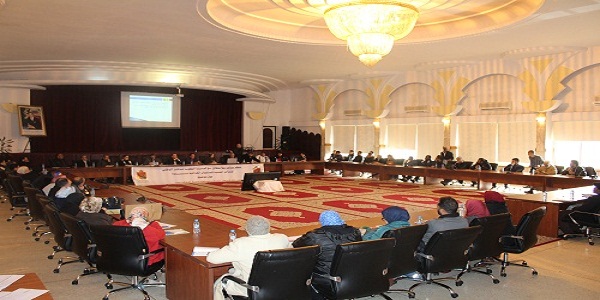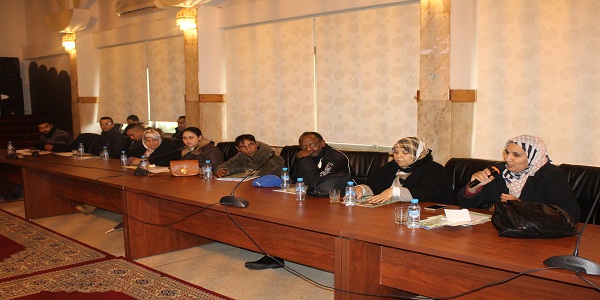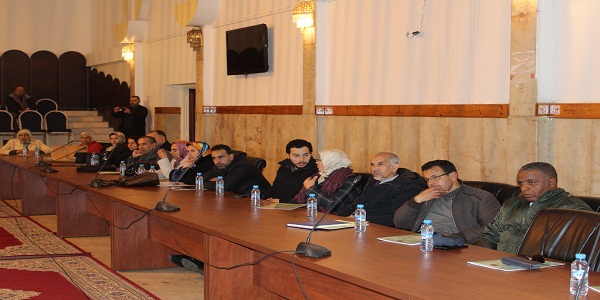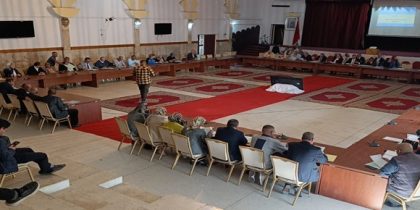Organization of a scientific conference on rabies in the commune of Salé


As part of the public awareness of the seriousness of rabies, and in the quest to fight against its proliferation, the municipality of Salé organized, in collaboration with the Regional Delegation of the National Office of Sanitary Security of Food Products , a scientific conference under the theme: “The scourge of rabies: its causes, its risks and its methods of prevention”; and this, Tuesday, March 06, 2018, at the main hall, from 15:30, under the chairmanship of Mr. Rachid Douibi, 1st vice-president of the communal council.
Took part to the enrichment of this meeting a number of specialists from the National Office for Food Safety and the interested civil society, in addition to Ms. Halima Chouika, vice-president of the municipal council of Salé delegated to the communal division of hygiene, Mr. Younes Sedrati, head of the division, as well as a number of elected representatives, civil society associations, civil servants and citizens.
At the beginning of this conference, Mr. Rachid Douibi, 1st vice-president of the commune council of Salé and host of this meeting, stressed the importance of the subject in question because of its important impact on the health of the citizen of the commune of Salé.

Then, in the framework of a presentation entitled: “The scourge of rabies: its causes, its risks and its methods of prevention”, Dr. Zakaria Cherkaoui, President of the Veterinary Center at the Regional Delegation of the National Office for Sanitary Safety of Food Products of Rabat-Salé-Kénitra Region, confirmed the seriousness of the pathology as a viral disease contagious and especially fatal after the onset of its symptoms, affecting warm-blooded animals and transmissible to humans by through a bite or claw. He also reviewed the early signs of this condition, the methods of his diagnosis, the legal texts published against him, as well as the obligation of the joint efforts of all to address the risk of this deadly syndrome; and this, in the presence of many constraints that limit the possibility of a possible final elimination.
For her part, Ms. Halima Chouika gave a presentation on the efforts made by the commune of Salé and the mobilization of available financial and logistical resources, in addition to awareness-raising activities in this area; despite the various difficulties of continuously increasing the number of stray dogs, the inefficiency of the measures taken to counteract this scourge, as well as the insufficiency of the resources allocated in this respect, despite the progress made, in addition to weak citizen interaction with related awareness and prevention campaigns.

And during his presentation under the theme: “The fight against rabies according to a reliable scientific approach”, Mr. Ahmed Tazi, representative of the Association for the Defense of Animals and Nature (ADAN), insisted on the inefficiency of extermination and massacre-based control campaigns, while clarifying other more lenient solutions that have proven effective in other countries such as India and Turkey; and this, through the vaccination of stray dogs, their identification and their sterilization, then their release on the given territory.
At the end of these scholarly interventions, and for this meeting to be more fruitful, the debate was opened to allow the audience to emit a lot of questions and remarks about this zoonotic disease, in order to assimilate all of its circumstances, some of which remain unclear, which has led to further clarification by the experts; similarly, a set of proposals and recommendations have been presented, which will be published shortly on the commune’s website, before being submitted to stakeholders for their activation.
- Presentation by Dr. Zakaria Cherkaoui, President of the Veterinary Center at the Regional Delegation of the National Office for Sanitary Safety of Food Products of Rabat-Salé-Kénitra Region;
- Presentation by Mrs. Halima Chouika, vice-president of the commune council of Salé delegated to the communal division of hygiene.




